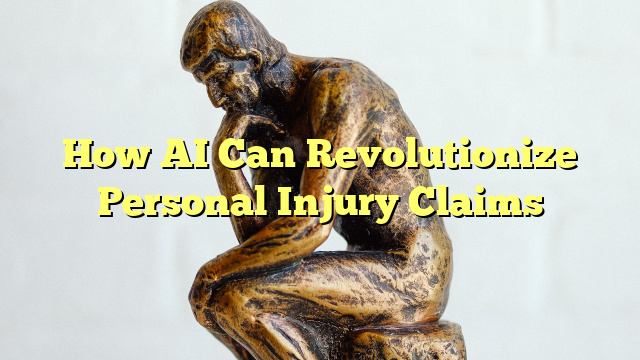1. Introduction
Artificial intelligence (AI) has the potential to revolutionize various industries, including personal injury claims. With advancements in machine learning and data analysis, AI can streamline the claims process, improve accuracy, and provide faster resolutions. However, as AI becomes more prevalent, questions arise regarding legal liability and the impact on the legal profession.
2. AI in Personal Injury Claims
AI can play a significant role in personal injury claims by automating various tasks and providing valuable insights. For example, AI algorithms can analyze medical records and identify patterns to assess the severity of injuries. This can help insurance companies determine appropriate compensation amounts and expedite the claims process.
Furthermore, AI-powered chatbots can assist claimants in submitting their claims and provide real-time updates on the status of their cases. This improves customer experience and reduces the need for manual intervention.
3. Legal Liability of AI
One of the key questions surrounding AI is the legal liability for damages caused by AI systems. As AI becomes more autonomous and capable of making decisions, it raises concerns about who should be held responsible for any harm caused.
Currently, legal liability for AI-related damages is often attributed to the individuals or organizations that develop, deploy, or operate the AI systems. However, as AI becomes more sophisticated and independent, there may be a need to establish new legal frameworks to address liability issues.
4. AI in Insurance
In the insurance industry, AI can be used to assess risks, process claims, and detect fraudulent activities. By analyzing large amounts of data, AI algorithms can identify patterns and anomalies that humans may overlook. This helps insurance companies make more accurate underwriting decisions and detect potential fraud.
Additionally, AI can automate claims processing, reducing the time and resources required to handle claims. This improves efficiency and allows insurers to provide faster resolutions to policyholders.
5. Impact on the Legal Profession
The rise of AI in the legal profession has both positive and negative implications. On one hand, AI can automate repetitive tasks, such as document review and legal research, allowing lawyers to focus on more complex and strategic work. This can increase productivity and efficiency within law firms.
However, AI also raises concerns about job displacement and ethical considerations. As AI systems become more advanced, there is a possibility of replacing certain legal roles, leading to job losses. Additionally, ethical issues arise when AI algorithms make decisions that may have significant consequences without human intervention.
6. Conclusion
AI has the potential to revolutionize personal injury claims by improving efficiency, accuracy, and customer experience. However, it also raises legal and ethical questions regarding liability and the impact on the legal profession. As AI continues to advance, it is crucial for lawmakers, insurers, and legal professionals to address these challenges and establish appropriate frameworks.

